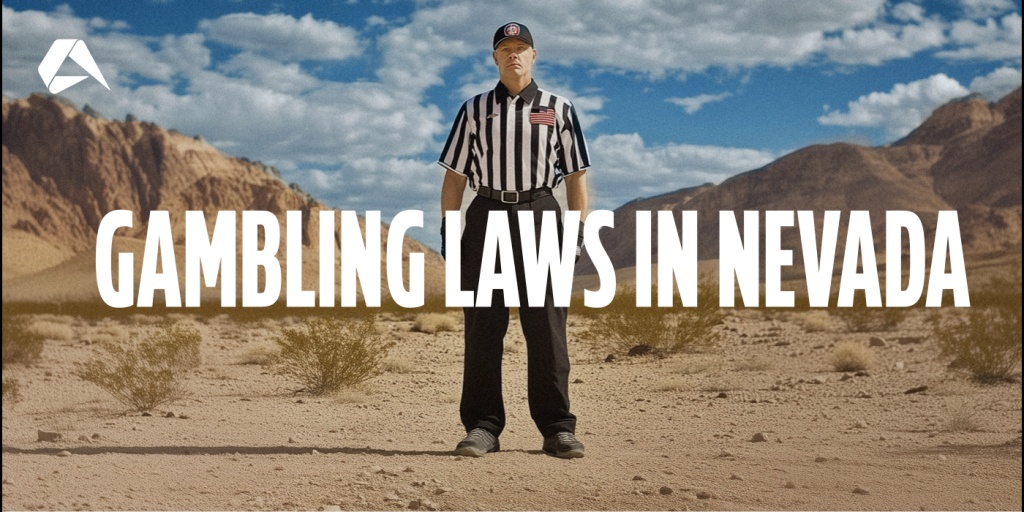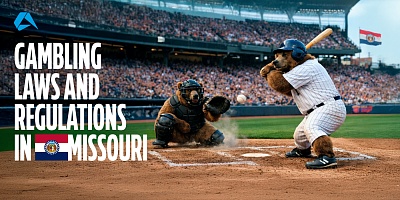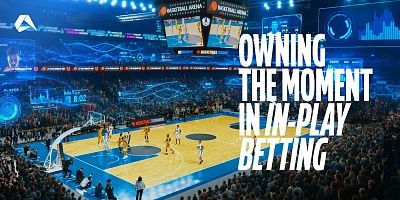Nevada’s gambling market is unlike any other: a tightly regulated, fiercely competitive, and always evolving high-yield market. Whether you're exploring entry into the state or positioning for future opportunities, understanding its legal climate is a must for ambitious operators. From licensing complexities to potential shifts in online gaming laws, this guide lays all the cards on the table. Will Nevada open the doors to full-scale iGaming? How can new entrants secure a foothold? Let's examine the latest insights that could shape your next strategic move.
Disclaimer
This information is not intended to be legal advice and is solely extracted from open sources. It should not be relied upon as a substitute for professional legal advice and Altenar does not accept any liability in relation to its use.
Historical Evolution of Gambling in Nevada
Nevada’s relationship with gambling is one of high stakes, both on and off the casino floor. The state’s gaming laws have shaped its economy and set precedents for gambling regulation across the United States.
A Gamble That Paid Off (1931)
At the height of the Great Depression, Nevada was desperate for economic relief. With mining revenues dwindling and jobs disappearing, the state legislature took the bold step of legalising gambling in 1931. This wasn’t just a short-term fix but a calculated bet on Nevada’s future. In the years that followed, small gaming houses began to appear, catering to travellers and locals alike. What started as a lifeline for the economy soon became a defining industry.
Regulating the Wild West (1950s–1970s)
By the mid-20th century, Nevada’s gaming boom attracted high rollers and organised crime. In response to this, the state tightened control by establishing the Nevada Gaming Control Board (NGCB) in 1955 and the Nevada Gaming Commission (NGC) in 1959. These regulatory bodies were tasked with licensing operators, enforcing compliance, and ensuring the industry remained free from criminal influence. Their efforts established Nevada’s reputation as a legitimate and well-regulated gaming hub, drawing in major corporate investors and opening the door for large publicly-traded casino operators.
A Digital Frontier (2001–2013)
Nevada was among the first to explore online gambling legislation in the early years of the internet revolution. In 2001, the state passed laws allowing for regulated online gaming. However, it wasn’t until 2013 that Nevada made history by becoming the first US state to legalise online poker. This helped maintain the integrity of the game while protecting players. Despite this progress, Nevada remained hesitant to expand into online casino gaming, wary of undermining its thriving land-based casino sector.
A Unique Approach to Gambling (Present Day)
While states like New Jersey and Pennsylvania have embraced full-scale online gambling, Nevada has chosen a more selective approach. The state allows sports betting and online poker, but online casinos remain off-limits. The reasoning is simple: Las Vegas is the world’s gaming capital, and lawmakers are reluctant to introduce competition that could shift revenue away from its resort-driven economy.
Adding to Nevada’s firm stance, it remains one of the only US states without a state lottery. This decision dates back to its early legislative framework, which prioritised private-sector gaming over government-run gambling. This contrasts sharply with other states that rely on lotteries as a source of public funding.
While the future of online gaming in Nevada remains uncertain, one thing is clear. When it comes to gambling laws, Nevada plays its cards close to the chest.
The Legal Framework
From its world-renowned land-based casinos to its selective approach to online gaming, the state's legal framework sets a high benchmark for compliance. Understanding the regulatory environment of gambling activities within the state is essential for operators looking to establish a foothold in one of the world's most tightly-governed gaming jurisdictions.
Land-Based Gambling Regulations
Nevada’s land-based gambling industry operates under a regulatory framework that has become a model for jurisdictions globally. At its core are two key regulatory bodies: the Nevada Gaming Control Board (NGCB) and the Nevada Gaming Commission (NGC), working in unison to oversee licensing, compliance, and enforcement of gambling activities within the state.
The NGCB is the sector’s investigative and enforcement arm. It is responsible for conducting background checks on applicants, auditing financial records, and ensuring compliance with state and federal laws. No gambling licence in Nevada is granted without the NGCB’s thorough scrutiny. The NGC, on the other hand, has the final say on licensing decisions, approving or denying applications based on its findings. Together, they form a two-tiered system that ensures operators meet the highest standards of financial integrity, operational transparency, and responsible gaming.
As you might imagine, securing a licence is a rigorous process. Casinos, sportsbooks, and racebooks must demonstrate financial stability, submit detailed operational plans, and prove that key stakeholders meet suitability requirements. Regulation 5.011 of the Nevada Gaming Control Act sets strict eligibility criteria, and any failure to comply with financial or ethical standards can lead to licence rejection or revocation.
Beyond licensing, AML compliance, like in all other regulated jurisdictions, is non-negotiable. Operators must implement risk-based anti-money laundering programmes, adhering to the Bank Secrecy Act (BSA) and Nevada’s Regulation 6A, which mandates transaction monitoring, suspicious activity reporting, and stringent record-keeping. Regular audits ensure ongoing compliance, reinforcing Nevada’s reputation as one of the world’s most tightly-regulated gambling jurisdictions.
Online Gambling in Nevada
The US state of Nevada permits online poker and mobile sports betting while restricting full-scale online casino gaming. Operators seeking entry into the digital market face a regulatory framework different from land-based gambling.
Online Poker and Mobile Sports Betting
Nevada has allowed online poker since 2013, making it the first US state to legalise and regulate the activity. Platforms must obtain an Interactive Gaming Licence from the NGC and the NGCB to operate. Compliance requirements include geolocation restrictions, ensuring that only players physically located within state borders can participate.
This US state also contributes to the Multi-State Internet Gaming Agreement (MSIGA), which allows online poker operators to share player pools with other states. However, this agreement is limited to poker and does not provide for broader iGaming expansion.
Sports betting, both retail and mobile, is also legal. But unlike most other states, mobile sportsbooks must be tied to a licensed land-based casino. Players must register in person before wagering online. This is an extra regulatory step aimed at maintaining control over digital operations.
Online Casinos
Despite being a global gaming hub, Nevada has not legalised online casino games in order to protect land-based casino revenues. This is particularly true of Las Vegas, where resorts rely on in-person gaming, hospitality, and entertainment spending. While some legislators have proposed expanding digital offerings, online casino gaming remains off the table - for now at least.
Industry experts believe that as technology evolves and consumer demand for digital gaming increases, Nevada may eventually consider expanding its online gambling offerings. However, any such move would require careful deliberation to balance the interests of all stakeholders.
Who Can (and Cannot) Get a Nevada Gambling Licence?
Nevada's gambling licences are some of the most highly-sought after in the industry, but not everyone qualifies. While the state operates one of the world’s most sophisticated regulatory frameworks, its licensing rules differ from other jurisdictions in a few key ways.
Unlike states such as New Jersey and Pennsylvania, where independent online-only operators can thrive, Nevada prioritises casino-backed operators. This policy effectively limits the market to companies with strong ties to Nevada’s established gaming scene. While foreign-owned operators can apply, it’s true to say that the state does not offer a straightforward path to licensing for overseas companies.
The Nevada Gaming Control Board (NGCB) conducts rigorous background checks on corporate structures, financial holdings, and controlling interests. A company seeking to enter the Nevada market must establish a US-based entity, ensuring full compliance with state and federal regulations.
In addition, Nevada’s corporate gaming model differs from other US states. Unlike jurisdictions that allow small, independent operators, Nevada’s gaming scene is dominated by major casino corporations, which has encouraged publicly-traded companies to shape the industry. Applicants seeking a licence must prove that their corporate structure, financial interests, and executive leadership align with the state's strict suitability standards. Any history of financial instability, criminal investigations, or ambiguous business dealings with previously-rejected applicants could result in disqualification.
Common Reasons for Licence Rejection
Licensing applications are regularly denied, often for reasons unique to Nevada. Some of the most common grounds for rejection include:
-
Failure to establish strong local partnerships: Nevada’s preference for casino-backed licences means applicants without ties to land-based properties face an uphill battle.
-
Lack of financial transparency: Unlike some states where operators can simply submit balance sheets, Nevada requires deep forensic accounting reviews of all financial stakeholders.
-
Prior association with "unsuitable" individuals: The NGCB maintains a list of individuals and businesses deemed unsuitable for gaming operations in Nevada. Any prior connection to these entities can lead to immediate disqualification.
-
Providing False Statements: Providing false information or omitting material facts in applications or communications with the NGCB can lead to denial.
-
Failure to Appear as Requested: Failure to appear to testify when summoned by the NGCB or the NGC without a valid excuse constitutes grounds for denial.
How to Get a Gambling Licence in Nevada
Operators who aim to enter the gaming sector in this state must understand the types of gaming licences available. Nevada offers two primary categories of gaming licences:
-
Restricted Gaming Licence: This licence permits the operation of 15 or fewer slot machines without any live games, typically in establishments such as bars or convenience stores.
-
Non-Restricted Gaming Licence: This licence applies to larger operations, including casinos with more than 15 slot machines and/or any number of table games. Operators intending to offer mobile sports betting must obtain a non-restricted gaming licence.
Note
An Interactive Gaming Licence is required only for operators offering online poker, as state regulations strictly limit interactive gaming to this activity.
Here are the essential steps that iGaming operators need to take to acquire a Mobile Sports Betting Licence in Nevada:
1. Understand Nevada’s Gambling Laws and Regulations:
Before applying for a licence, operators should thoroughly review Nevada’s gambling laws, statutes, and regulations to understand the state’s unique licensing structure. Key rules to review include the Nevada Gaming Control Act, Regulation 22 (Sports Pools), and the Bank Secrecy Act (BSA) for AML compliance. The Nevada Gaming Control Board (NGCB) website provides access to all relevant laws, statutes and regulations for gambling operations within the state.
2. Apply for a Non-Restricted Gaming Licence
To launch a sportsbook, operators must first secure a Non-Restricted Gaming Licence, which is required for large-scale gaming operations in Nevada. This process involves extensive background checks, financial audits, and regulatory vetting to ensure the applicant meets the state’s strict compliance standards. The application is submitted to the NGCB for initial review and evaluation.
3. Apply for a Race Book and/or Sports Pool Licence
Once approved for a Non-Restricted Gaming Licence, operators must then obtain a Race Book and/or Sports Pool Licence, which is specifically required to offer sports betting services, including mobile sportsbooks. This stage involves further scrutiny of operational controls, geolocation measures, and compliance with anti-money laundering and responsible gaming regulations. Again, applications for this licence are submitted to the NGCB.
4. Partner with a Land-Based Casino
Nevada law requires mobile sportsbook operators to be affiliated with a licensed land-based casino, ensuring that all sports betting operations remain connected to the state’s traditional gaming infrastructure. This partnership is mandatory, as standalone online sportsbook licences do not exist in Nevada. Without an agreement with a casino, an operator cannot legally launch mobile sports betting services in the state.
5. Undergo Public Hearings & Regulatory Review
Once both licences are obtained and a casino partnership is in place, the NGCB and the NGC conduct public hearings to assess the applicant’s suitability. These sessions allow regulators to examine the operator’s financial integrity, responsible gaming policies, and overall business strategy before granting final approval.
6. Maintain Compliance & Undergo Ongoing Audits
After obtaining the necessary licences and launching operations, sportsbooks must comply with ongoing financial reporting and regulatory oversight. The NGCB conducts regular compliance audits on an ongoing basis. Any failure to comply with state and federal gaming laws can result in heavy fines or the revocation of licences, making continued compliance a top priority for all Nevada sportsbook operators.
Licence Costs and Taxation
Unlike other jurisdictions where a single licence covers online betting, operators looking to launch a mobile sportsbook in Nevada must navigate a two-tiered licensing process, requiring both a Non-Restricted Gaming Licence and a Race Book and/or Sports Pool Licence.
To illustrate the financial obligations involved, let’s consider a fictitious sports betting brand, EliteBet Sports, which aims to enter the Nevada market with a large-scale mobile sportsbook.
The First Requirement - The Non-Restricted Gaming Licence
The cost of this licence depends on the number of games operated under it. Since EliteBet Sports plans to provide mobile sports betting and partner with a land-based casino, it falls into the highest licensing tier:
-
Initial Application Fee: $16,000 (for large-scale operators)
-
Annual Renewal Fee: $16,000 + $200 per additional game (if applicable)
However, securing this licence alone does not authorise the company to take bets. The company must also apply for a Race Book and/or Sports Pool Licence.
Sports Betting Approval - The Race Book and/or Sports Pool Licence
This licence explicitly authorises sports betting activities, including mobile wagering. The costs associated with this licence are determined by the sportsbook’s total betting handle (wagered amounts) per month:
-
One-Time Application Fee: $500
-
Monthly Fees Based on Handle:
-
Up to $1 million = $100/month
-
$1M - $2M = $200/month
-
Over $2M = $300/month
Total Licensing Cost Breakdown for EliteBet Sports
| Licence Type | Initial Cost | Annual Renewal | Ongoing Monthly Fees |
|---|---|---|---|
| Non-Restricted Gaming Licence | $16,000 | $16,000 + $200 per additional game | N/A |
| Race Book and/or Sports Pool Licence | $500 | Included in monthly fees | $300/month ($3,600/year) |
Note
All fees associated with gaming licences in Nevada are published by the NGCB. Operators can access the latest licensing fee schedules, renewal costs, and compliance obligations by visiting the NGCB’s official Licensing & Taxation Page. This page provides up-to-date figures for all gaming-related licences, ensuring applicants can accurately estimate their financial obligations before entering the market.
In addition to licence costs, operators must account for Nevada’s tiered gaming tax structure. This tax applies to gross gaming revenue (GGR) and varies depending on monthly earnings. Nevada's GGR tax is relatively modest compared to other jurisdictions. Operators are taxed at 3.5% on monthly GGR up to $50,000, 4.5% on GGR between $50,000 and $134,000, and 6.75% on GGR exceeding $134,000.
Land-based operators may also be subject to the Live Entertainment Tax (LET), which applies to live entertainment venues and can impact casinos hosting such events.
Future Trends in Nevada Gambling Regulation
Nevada’s gambling industry is presently at a crossroads, with several potential developments on the horizon. Long the gold standard for gaming regulation, the state faces pressure to adapt as digital gaming reshapes the US market. The choices made in the coming years could determine whether it retains its dominance or falls behind more progressive jurisdictions.
Despite leading the charge in gambling legalisation, Nevada has yet to embrace full-scale online casinos. Other states are now generating billions in online gaming revenue. Yet, resistance remains strong in Nevada. With casino resorts dependent on tourism, hospitality, and entertainment spending, the fear is that legalising online casinos could shift money away from the Strip. However, industry insiders believe a controlled, casino-backed rollout could strike a balance, allowing digital expansion while protecting land-based revenue.
Meanwhile, Nevada’s sports betting market is facing a different kind of debate - whether to allow non-casino operators, such as sports teams or racetracks, to run sportsbooks. Currently, all mobile betting platforms must be tied to a land-based casino, a model that may soon be challenged. Breaking the casino monopoly could modernise the industry, but any changes would require major legislative shifts.
Beyond licensing battles, Nevada faces a shifting legislative battleground that could introduce new variables for operators. The long-debated introduction of a state lottery, previously unthinkable in a casino-dominated market, is back on the table, with supporters arguing that it could diversify state revenue streams.
At the same time, emerging technologies are forcing regulators to rethink oversight. AI-driven risk management and real-time compliance monitoring tools are pushing the industry toward more sophisticated regulatory frameworks. For this reason, operators hoping for successful market entry will need to demonstrate technological adaptability alongside financial stability, as Nevada’s evolving regulations look set to demand more than just capital.
For iGaming operators watching from the sidelines, the road to Nevada remains challenging but not impossible. The most viable entry points remain through partnerships with existing land-based casino operators, particularly in sports betting and poker. But the real opportunities lie in long-term positioning. Legislative shifts happen slowly—until they don’t.
Should Nevada give the green light to full-scale iGaming, the operators who have built strong relationships and established local credibility will be the ones best placed to take advantage. Moreover, entering the market is one thing, but being ready for tomorrow is what truly matters.
Will you be ready if Nevada opens its doors to full-scale online gaming? Future-proof your business with Altenar’s US-compliant sportsbook and casino software. Book a bespoke demonstration now and prepare for what comes next.
Disclaimer
This information is not intended to be legal advice and is solely extracted from open sources. It should not be relied upon as a substitute for professional legal advice and Altenar does not accept any liability in relation to its use.













